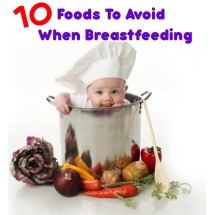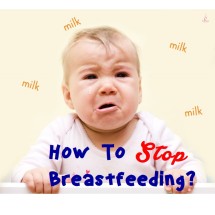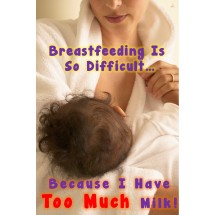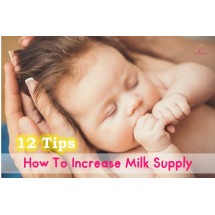
Low milk supply is a challenge that any breastfeeding mother could face. It can be caused by biological, physical, psychological and functional factors.
Mount Elizabeth Hospital’s lactation consultant, Ms Loh Lee Lian, shares an example of the difficulties one mother went through during her breastfeeding journey.
“I received a phone call from a tearful new mother of a two-week-old baby boy, complaining that her baby was almost always fretful during breastfeeding. Her breasts, too, no longer felt as “filled up” as before.
 This new mother was discharged from hospital on the fourth day after her baby’s delivery. During her hospital stay, her baby latched well and was feeding quite regularly – every two to three hours. Her breasts were “filling up” on the day of discharge and she was encouraged and determined to do total breastfeeding.
This new mother was discharged from hospital on the fourth day after her baby’s delivery. During her hospital stay, her baby latched well and was feeding quite regularly – every two to three hours. Her breasts were “filling up” on the day of discharge and she was encouraged and determined to do total breastfeeding.
After some questions, I found out that this new mother was staying with her mother-in-law and had engaged the help of a confinement nanny. She told me that she was breastfeeding quite well and regularly during the first few days at home. At times, she was also cluster feeding – frequent, or even constant, feeding over a period of time.
However, her mother-in-law felt that the breast milk looked diluted and with the frequent demand of breastfeeding, breast milk was insufficient for the baby’s needs. As the baby was the first grandson in the family, her mother-in-law also preferred to do bottle feeding. The mother was thus pressured to top up with formula feeds.
Subsequently, the baby slept for longer periods. When ready for feeds, he did not latch well or feed long enough and became fretful on the breasts. The mother’s breasts became engorged a few times when she was not breastfeeding. Due to the engorgement, she could not pump out the breast milk effectively, resulting in slow and low flow.
Due to respect for her mother-in-law, this mother caved in to her wishes in allowing formula feeds. At the same time she felt like a failure at breastfeeding, which caused her to suffer low morale and low self-esteem.
To help this new mother, I gave her a lot of reassurance to boost her morale and reinforce her understanding of how to sustain the breast milk supply. I advised her to always breastfeed her baby first; formula feed should be supplementary. Once the breast milk increases, the formula supplement was slowly decreased according to the baby’s demand. I also recommended galactagogues – food or drugs that promote or increase the flow of a mother’s milk – like Fennel tea was recommended to boost breast milk supply.
We also invited the mother-in-law to the meet us as a way to assure her that total and regular breastfeeding is sufficient nutrition for the baby. For example, one way to note that the baby is feeding well is indicated in the regularity and frequency of the breastfeeding (8 to 12 times in 24 hours) and a contented baby after feeding. Second, “what goes in will come out”. The number of times the baby urinates and passes motion is an indicator of how well the baby is being breastfed. Visits to the paediatrician to check on the baby’s weight gain also reassured the grandmother that all was well with her grandson.
The above incidence is one of the many causes of low milk supply. Basically, breastfeeding is a ‘demand and supply’ issue. Where there is regular demand, i.e. when baby suckles on the breast, the body will stimulate the release of the hormones Prolactin and Oxytocin and thus release milk supply. Supply may be affected by psychological causes such as anxiety, worry, and lack of sleep.
Addressing low milk supply involves taking into account the causes and working around mother and baby’s behaviour as well as the condition of the breasts.
Ms Loh Lee Lian shares 12 invaluable tips on how to increase your milk supply!
By Ms Loh Lee Lian
Lactation Consultant
Mount Elizabeth Hospital
Ms Loh Lee Lian is a registered nurse and midwife who has more than 25 years of experience in maternity care.
This article is part of Breastfeeding with Love campaign, initiated by The New Age Parents and New Age Pregnancy.
Join the Breastfeeding with Love Facebook Group to find out more and be part of our breastfeeding online community!
 |
Click on the logos to find out more about our supporting partners.






